Highways, Roads, Streets and Traffic
Miss Kansas Turnpike
I found two holders of the 'Miss Kansas Turnpike' title. The first was Theo Tautfest, who won the title in 1960. The second was Lois Rhodus, who held the title in 1961, while simultaneously being 'Miss Kansas City'.Some info about the Kansas Turnpike from Wikipedia:
Because it predates the Interstate Highway System, the road is not engineered to current Interstate Highway standards and notably lacks a regulation-width median. To reduce the risk of head-on collisions, the Kansas Turnpike now has a continuous, permanent Jersey barrier in the median over its entire length. On opening, there was no fixed speed limit on the highway; drivers were merely asked to keep to a "reasonable and proper" limit, although, shortly afterward, signs were erected in certain stretches indicating a maximum speed of 80 mph (130 km/h).

Clinton Daily Democrat - May 31, 1960

"Lois Rhodus, Miss Kansas Turnpike, poses in a convertible at the Kansas City Athletics American League ballpark in 1961." Source: Pageant, by Keith Lovegrove
Posted By: Alex - Fri Dec 27, 2024 -
Comments (2)
Category: Awards, Prizes, Competitions and Contests, Highways, Roads, Streets and Traffic, Transportation, 1960s
Killer Tree


Posted By: Paul - Tue Sep 03, 2024 -
Comments (2)
Category: Death, Highways, Roads, Streets and Traffic, Nature, Synchronicity and Coincidence, 1960s
One Little Indian
One Little Indian, Grant Munro, provided by the National Film Board of Canada
Posted By: Paul - Wed May 08, 2024 -
Comments (0)
Category: Highways, Roads, Streets and Traffic, Magic and Illusions and Sleight of Hand, PSA’s, Stop-motion Animation, 1950s, North America, Native Americans, Circuses, Carnivals, and Other Traveling Shows
Shunpikes
Residents of the Northeastern U.S. may be familiar with the concept of shunpikes. Though I lived in Massachusetts for five years and just learned of their existence recently.A 'shunpike' is a road deliberately built, or taken, to avoid a toll road. It's short for 'shunning a turnpike'. This differentiates a shunpike from a 'freeway' which also doesn't have tolls, but wasn't deliberately built to avoid an existing toll road.
More info: wikipedia
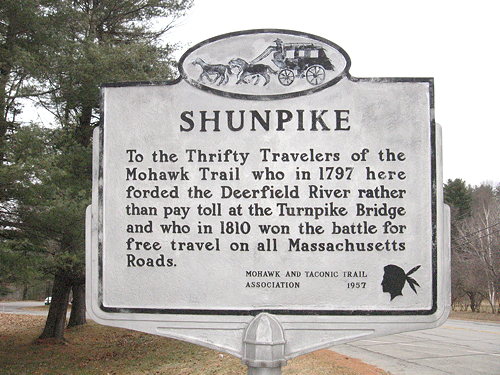
image source: hmdb.org
Shunpikes are like the engineering equivalent of spite houses. Their purpose is to give the finger to someone else (the owner of the toll road). As such, they often inspire bitter grievances and feuds. Details of one such feud was reported in the Poughkeepsie Journal (June 3, 1962):
The principal landowner in the Lithgow area was old David Johnston who called his vast property and home Lithgow, a name borrowed by the little settlement nearby... David Johnson was so infuriated that the new turnpike was laid out considerably west of the old road, and so, quite a distance from his home, that he built the Shunpike on his own land...
Whatever the plans for the Shunpike were at that time, they certainly irked the Dutchess Turnpike Co. It published a notice, signed Jesse Oakley and dated Dec. 16, 1809, in the Poughkeepsie Journal of Dec. 20 telling of its intention of asking the next Legislature to permit to to change the location of its toll gates "from time to time in case any road shall be opened to permit travelers to pass around it. . ."
Residents of the Towns of Washington and Clinton promptly called an "Anti-Turnpike" meeting for Dec. 29.
Posted By: Alex - Thu May 26, 2022 -
Comments (3)
Category: Highways, Roads, Streets and Traffic, Pranks and Revenge
Mini skirts for road safety
1970: Liverpool officer Lionel Piper urged young women to wear mini skirts. In the interests of road safety. Sure, that was it... road safety!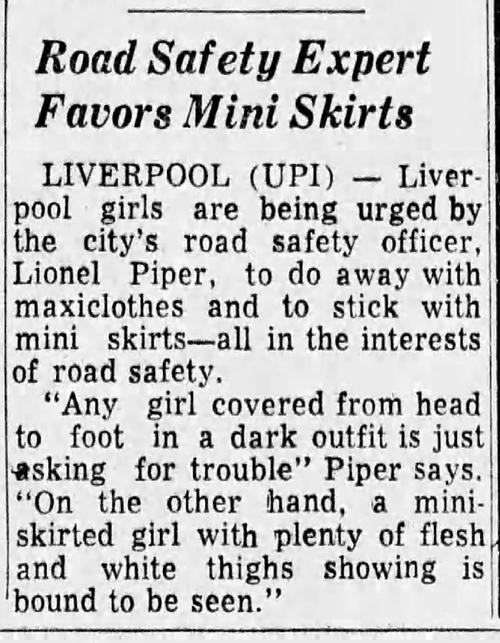
The Hackensack Record - Jan 14, 1970
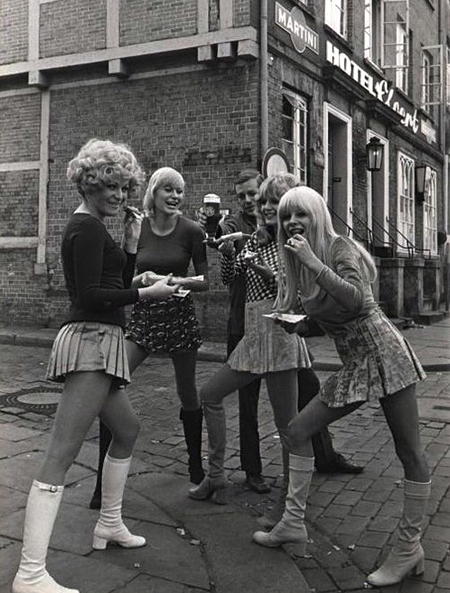
Young women in the 1970s dressed for road safety
Posted By: Alex - Mon Oct 26, 2020 -
Comments (3)
Category: Fashion, Highways, Roads, Streets and Traffic, 1970s
Safety Kisses
Throughout the 20th century, it seemed to be widely assumed that the mood of the husband was determined by the behavior of his wife at home. So, concluded the District of Columbia's traffic safety office in 1963, if a man was in a 'disgruntled disposition' and consequently got into a traffic accident, it must have been the fault of his wife who didn't cheer him up adequately when he left home with a goodbye kiss "as though she meant it."See also: Whose fault is it when your husband is cross at breakfast?
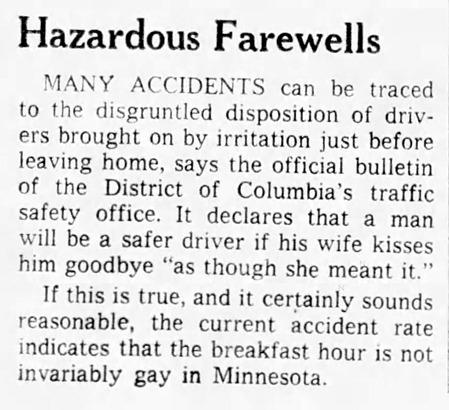
Minneapolis Star - Nov 12, 1963
Posted By: Alex - Wed May 20, 2020 -
Comments (2)
Category: Highways, Roads, Streets and Traffic, Gender, Husbands, Wives, 1960s
The Mills & Boon Motorway
Mills & Boon books are the British equivalent of Harlequin romances.Which is the setup for an odd fact, which sounded to me like an urban legend when I first came across it, but it turned out to be true. As you drive along the M6 Motorway in Britain, you're driving on copies of Mills & Boon romances, because 2.5 million of these books were used in the construction of the road.
According to BBC News:
Richard Beal, the company's project manager for the M6 Toll, said the books' absorbent qualities made them a vital ingredient in the construction of the country's first pay-as-you-go motorway.... for every mile of motorway approximately 45,000 books were needed.
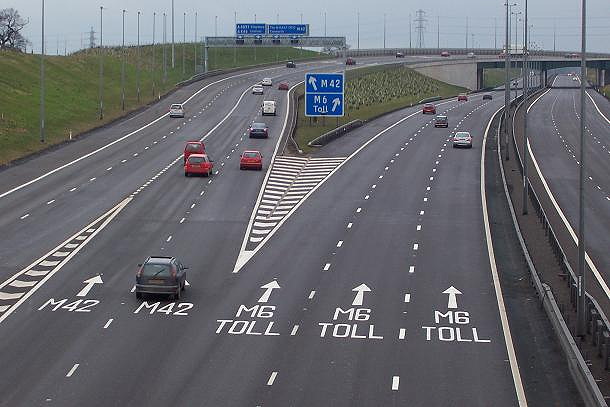
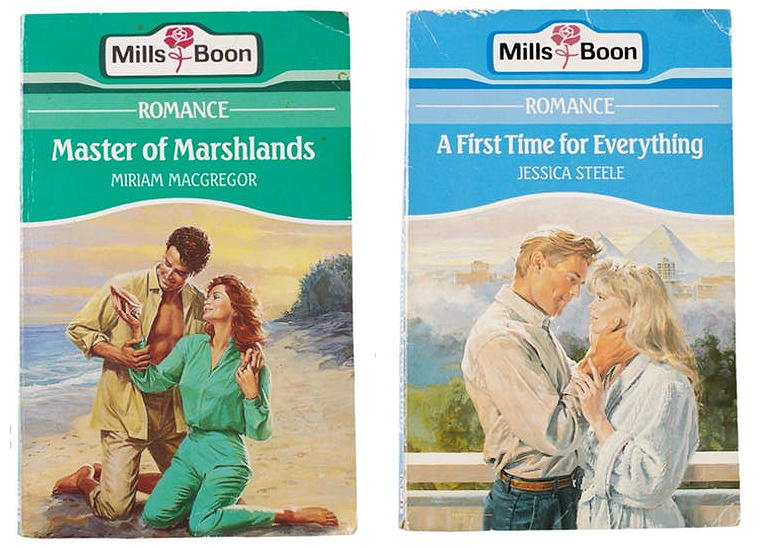
Posted By: Alex - Wed Apr 08, 2020 -
Comments (0)
Category: Highways, Roads, Streets and Traffic, Books
“Breakfast” by Cyriak
Posted By: Paul - Fri Jul 19, 2019 -
Comments (3)
Category: Annoying Things, Daredevils, Stuntpeople and Thrillseekers, Death, Destruction, Food, Highways, Roads, Streets and Traffic, Surrealism, Foreign Customs, Fictional Monsters, Cars
The origin of white road lines
Road lines are of those things one tends to take for granted, but obviously someone had to first think of the idea, and credit for it is given to Dr. June McCarroll of Indio, CA.As told by the LA Times (Oct 12, 2003):
Later, while driving on another, newer highway, she noticed that the road had a definite middle joint where it had been widened from 8 feet to 16. The pronounced center ridge caused cars to stay on their own side. A center line painted down the middle would serve the same purpose, she decided.
Known for confidence and straight talk, she took her idea to the Riverside County Board of Supervisors and the Chamber of Commerce. They gave her a polite ear but nothing else.
She took direct action. She got down on her hands and knees and painted a 2-mile-long 4-inch-wide white stripe down the center of the road that passed in front of her house on Indio Boulevard.
She was sure that her example would illustrate the idea’s safety benefits, but change was slow to come. For seven years, she wrote letters and petitioned the county and state to adopt the white lines.
Finally, with the support of the Indio Women’s Club and the California Federation of Women’s Clubs — which had previously campaigned to add roadside markers and to preserve El Camino Real — she prevailed. In 1924, the Legislature authorized the State Highway Commission to paint center lines.
From Doc June’s idea sprang colors, stripes and other markings on streets and highways to enhance motoring safety. By the time she died in 1954, at 86, striping highways was commonplace across the country.
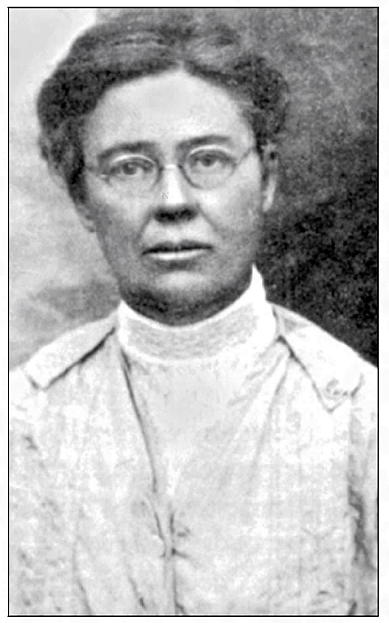
Dr. June McCarroll
There is some controversy, since two Michigan men (Kenneth Sawyer and Edward Hines) apparently had the same idea before McCaroll. And they even painted some white stripes on a road. But unlike her, they don't seem to have tried to get their state government to adopt the idea. So, I think McCarroll rightly gets credit as the originator of the idea.
Posted By: Alex - Wed Jun 19, 2019 -
Comments (3)
Category: Highways, Roads, Streets and Traffic, 1910s
Paved Deer
I've heard of road-line painting crews not bothering to move roadkill out of the way. But I hadn't heard before of a paving crew simply paving over a dead animal instead of moving it.For some pics of roadkill painted over see: improbable research
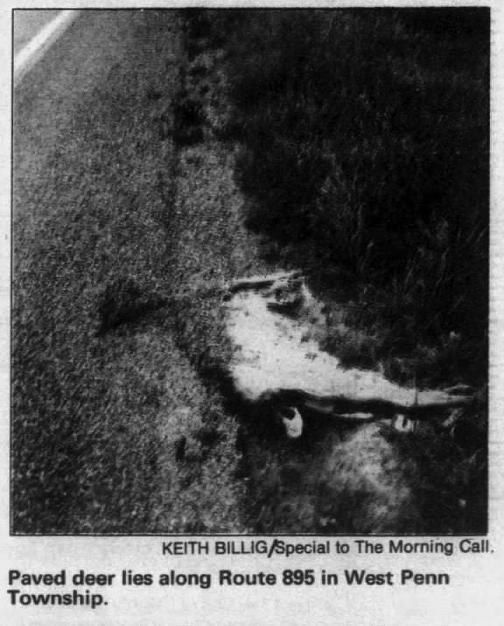
Allentown Morning Call - Aug 22, 1996
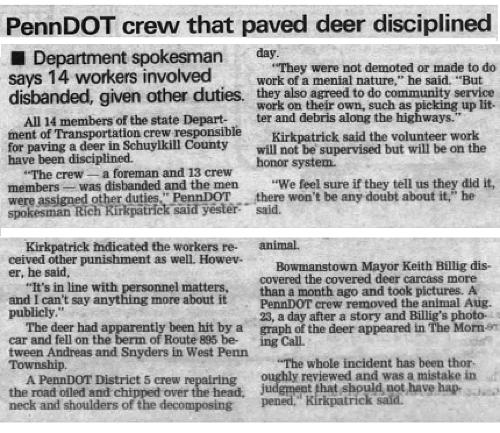
Allentown Morning Call - Sep 14, 1996
Posted By: Alex - Fri Sep 21, 2018 -
Comments (0)
Category: Animals, Death, Highways, Roads, Streets and Traffic

| Who We Are |
|---|
| Alex Boese Alex is the creator and curator of the Museum of Hoaxes. He's also the author of various weird, non-fiction, science-themed books such as Elephants on Acid and Psychedelic Apes. Paul Di Filippo Paul has been paid to put weird ideas into fictional form for over thirty years, in his career as a noted science fiction writer. He has recently begun blogging on many curious topics with three fellow writers at The Inferior 4+1. Contact Us |




